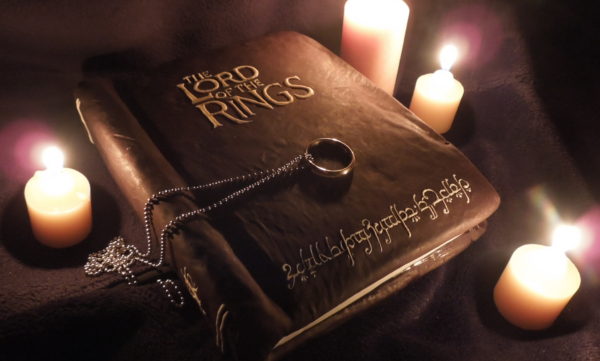I was an Atheist Until I Read “The Lord of the Rings”
by Fredric Heidemann
Filed under Atheism, Culture

I grew up in a loving, comfortable atheist household of professional scientists. My dad was a lapsed Catholic, and my mom was a lapsed Lutheran. From the time that I could think rationally on the subject, I did not believe in God. God was an imaginary being for which there was no proof. At best, God was a fantasy for half-witted people to compensate their ignorance and make themselves feel better about their own mortality. At worst, God was a perverse delusion responsible for most of the atrocities committed by the human race.
What broke the ice? What made me consider God’s existence a real possibility? The Lord of the Rings. I was a young teenager when I first read the Tolkien tomes, and it immediately captivated me. The fantasy world of Middle-Earth oozes life and profundity. The cultures of the various peoples are organic, rooted in tradition while maintaining a fresh, living energy. Mountains and forests have personalities, and the relationship between people and earth is marked by stewardship and intimacy. Creation knowing creation. Tolkien describes these things with beautiful prose that reads like its half poetry and half medieval history. Everything seems “deep” in The Lord of the Rings. The combination of character archetypes and assertive “lifeness” in the novel touches on an element of fundamental humanity. Every Lord of the Rings fan knows exactly what I’m talking about.
In my narrow confines of scientism, I had no way of processing what made Tolkien’s masterpiece so profound. How could a made-up fantasy world reveal anything about the “truth”? But I knew it did, and this changed my way of thinking. Are good and evil merely social constructions, or are they real on a deeper level? Why am I relating to ridiculous things like talking trees and corrupted wraiths? Why was I so captivated by this story that made fighting evil against all odds so profound? Why did it instill in me a longing for an adventure of the arduous good? And how does the story make sacrifice so appealing? The Lord of the Rings showed me a world where things seemed more “real” than the world I lived in. Not in a literal way, obviously; in a metaphorical, beyond-the-surface way. The beautiful struggle and self-sacrificial glory permeating The Lord of the Rings struck a chord in my soul and filled me with longing that I couldn’t easily dismiss.
My attempts to explain these problems in my naturalistic, atheistic worldview fell flat. The idea that being, beauty, and morality were merely productive illusions imposed on us through biological hardwiring crafted through the random process of natural selection rang hollow. If things so fundamental to human existence as meaning and morality are nothing more than productive illusions, what else is untrustworthy? Our five senses? Logical process? Our whole minds? If our being is nothing more than a collection of atoms reacting with each other in enormous complexity through cause and effect chains stretching back to the beginning, then we are floating blindly through space and time: there’s no rhyme, reason, or purpose. And, if that’s the case, then so much of what we consider essentially human is tragic a joke. After all, the human race, the earth, and the universe will go extinct. With a long enough timeline, what’s the point? Even the idea of accomplishing something is finally an illusion. At this juncture, the fruits of atheism were inevitable: nihilism, despair, and, most ironically, confusion.
Though seriously questioning atheism, I still had many objections. If God were real, why isn’t there more evidence for his existence? If God were real, why are there so many religions? Wouldn’t God want to clearly direct humanity to the source of truth? My doubts about atheism, however, continued to haunt me. If the supernatural does not exist, how can there be genuine moral obligations? The classic atheist response is that evolution has created a sophisticated herd instinct in the human race that causes us to want to be good to each other. Those people who lacked a moral compass were simply outcompeted by those of us with a sense of morality – those who could work together for our collective benefit.
Deep down, though, I knew this was specious. Even if it could fully account for our moral sense, which I questioned, it did not explain genuine moral obligations. Supposing the classic evolutionary theory of morality is true, it only explains why we perceive moral obligations; not whether (or why) there are moral obligations. Instead of explaining morality, it explains it away. The thorough-going immoralist could always object on the basis that he has been freed from the restrictive, outdated biological hardwiring of merely perceived moral obligations. My atheist friends and family would inevitably respond with something like, “Well, the immoralist’s position has never been fully successful, while there is historical evidence that generally being a ‘good person’ leads to a better ability to succeed, pass on ‘good person’ genes, etc.” Only sort of true. Much of history teaches that violence, greed, and domination pay off handsomely in the worldly sense.
But, the responses miss the point. Just because being a thorough-going immoralist hasn’t seemed to work to date doesn’t mean it wouldn’t later. After all, the hallmark of natural selection is random genetic change granting certain creatures a better ability to survive in a given environment. In the end, all the atheist can say to the immoralist is, “I disagree that your course of action will help the human race succeed.” That kind of statement, which is merely an opinion, is simply not what we mean when we say an action is immoral. Furthermore, who pronounced from on high that the success of the human race was the ultimate good? That itself is an assumption that cannot be empirically proven. Going back to the original problem, does “good” even exist? I realized that within the purely naturalistic worldview, all morality is finally a matter of opinion. All the moralist can say to the immoralist is, “My opinion is different than yours.” No more productive than arguing whether red is better than blue. I should clarify here that I never doubted the theory of human evolution. Nothing about it contradicts God’s order of creation. I’m also not saying that atheists are immoral. They just can’t account for the existence of genuine moral obligations. They are, like I was, living in great tension.
At some point the tension was too much: either morality is a farce, everything is random with no meaning, and the human mind is mired in inescapable confusion or atheism is false. I chose the latter. That was the logical side. On the emotional side, so many joys in this world have nothing to do with self-preservation or successful reproduction: art, music, a beautiful sunset, etc. I think deep down we all recognize that those kinds of aesthetic experiences may be the most joyful in this life, and these joys serve no productive purpose. The richness of life, which is on full poetic display in Tolkien’s Middle Earth, made me recognize that supposedly rational atheism did not reveal the truth of things; instead, it removed their intrinsic wonder and worth.
Having abandoned atheism, I still faced several objections to organized religion that are beyond the scope of this post. Suffice it to say that my critique of atheism gave me a natural monotheistic theology while The Lord of the Rings predisposed me to a sacramental spirituality. For now, however, let us remember the evangelistic power of beauty and narrative. Much like The Lord of the Rings, they are effective precisely because God is hidden and able to fly below the atheist radar that balks at anything overtly religious. In Middle Earth, the effects of a God-created universe are everywhere, but the source, God Himself, is hidden. No, it’s not that we believers understand The Lord of the Rings on some special level that the atheist does not. Just the opposite. The atheist who truly understands The Lord of the Rings is more of a believer than he thinks.
Related Posts
Note: Our goal is to cultivate serious and respectful dialogue. While it's OK to disagree—even encouraged!—any snarky, offensive, or off-topic comments will be deleted. Before commenting please read the Commenting Rules and Tips. If you're having trouble commenting, read the Commenting Instructions.












